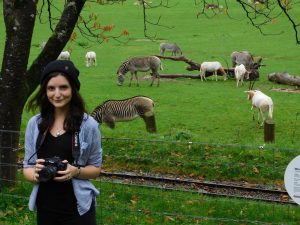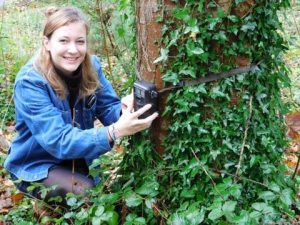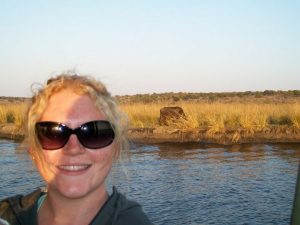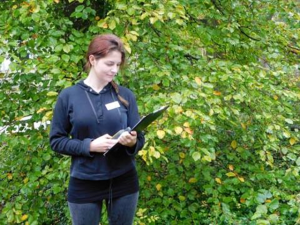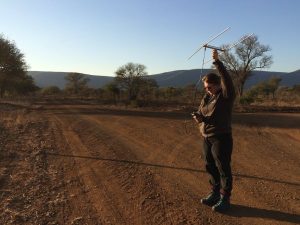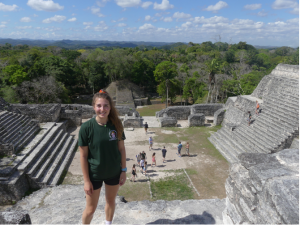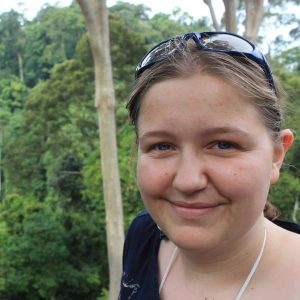Welcome to our 2017-2018 cohort of 10 new students! Having found their feet after starting the course back in October, they would now like to introduce themselves!
Ana Giovanetti
Background
I graduated with a Bachelor of Science in Applied Animal Biology from the University of British Columbia in 2016. Before endeavouring in graduate school, I’ve participated in several research projects including marine mammal rehabilitation, where I conducted my undergraduate thesis looking at potential indicators of Phocid Herpesvirus-1 in Harbour seals (Phoca vitulina) undergoing rehabilitation. During this time, I also worked as an assistant where I contributed directly in focus group studies looking at stakeholder perspectives of welfare challenges in the dairy industry. This sparked my interest in human-animal interactions and their impact on both human and animal well-being.
Research Area
I have a strong interest in human-wildlife interactions. Specifically, I’m interested in community involvement in conservation practice and how it can lessen negative interactions, symbiotically strengthening both the protection of African wildlife and the livelihood of its people.
Why I chose MRes Wildlife Conservation
I chose this program as it provided substantial training in field techniques and a well-rounded array of courses – all while giving us the opportunity to develop our own research projects alongside working professionals at Marwell Wildlife. It ticked all the boxes for what I’d hoped to gain from a wildlife conservation degree.
Future Aims
Ultimately, I plan to become a researcher and perhaps a professor in the field of wildlife conservation. It is my hope that this graduate study will equip me with the cutting-edge experience needed to contribute to the field’s goal of improving quality of life for animals (and people too).
Carla Broom
Background
BSc Biology (University of Southampton), 2017
Research Area
My undergraduate research focused on the effects of land use and management on barn owl (Tyto alba) breeding success and conservation. My main area of interest is herpetology, specifically the success of sand lizard (Lacerta agilis) reintroductions and the interactions between them and other species.
Why I chose MRes Wildlife Conservation
Working so closely with a conservation organisation such as Marwell Wildlife is a unique opportunity to experience how these establishments work, and to be involved with current, up-to-date research that is really making a difference in the country and the rest of the world.
Future Aims
Using the skills and knowledge taught in this course to work towards a career in wildlife conservation, wherever that may take me!
Daniel Turner
Background
Undergraduate degree in Biology from Sussex University. I have worked as an intern biologist for Nature Conservation Seychelles on an island called Aride in the Seychelles archipelago. My duties included turtle, invertebrate, other reptile and bird monitoring. I have also worked as a research assistant for The Society for Environmental Exploration in Madagascar. Research included biomonitoring across a spectrum of habitat types in order to investigate how local biota respond to human induced modification of the landscape. I have also completed personal research projects on how invertebrates respond to different land-use practices and how lemurs respond to human modified habitats.
Research Area
How ecological assemblages respond to land-use changes. Ecosystem services and ecosystem function. Secondary and degraded habitats are set to become the most widespread and available habitat for animals, therefore understanding how these communities respond to modified landscapes is crucial given their importance for many ecosystem functions and services that humans depend upon for health and wellbeing.
Why I chose MRes Wildlife Conservation
I wanted to undertake an extended research project to develop my analytical and statistical skills. Working with a Russel group university such as Southampton and a conservation institution such as Marwell Wildlife seemed like the perfect support network.
Future Aims
How and in what way can an expanding human population interact and coexist sustainably with the earth’s remaining biodiversity? Finding solutions that mean one does not exclude the other.
Elaine McCarthy
Background:
I graduated in 2016 with a BSc (Hons) in Zoology from University College Cork, in Ireland. My undergraduate research project focused on the behavioural dynamics and ecological impact of a pride of lions in a private reserve in South Africa.
Research Area
As I have a keen interest in large predators, I would like to conduct my research abroad and work on a project based on human – wildlife conflict.
Why I chose MRes Wildlife Conservation
I chose the MRes because of the collaboration with Marwell Wildlife, which gives students the chance to work alongside and learn from active conservation biologists on current issues, which ultimately provides an invaluable learning experience and exposure to the dynamic field of wildlife conservation.
Future Aims
I would like to work internationally on predator based research projects to mitigate impacts of human – wildlife conflict on predator populations and local communities.
Background: BSc Zoology (Hons) at the University of Southampton, graduating in 2016.
Research interests: I am enthusiastic about conservation biology as a whole, but currently my key interests are animal behaviour and its application in conservation, wildlife reintroduction and herpetology.
Why I chose MRes Wildlife Conservation: I was excited by the opportunity to work alongside active conservation biologists and develop a professional network, as well the programmes main focus on research and conducting a large independent field project.
Thoughts for the future? I would like to pursue a career in wildlife conservation and research, and hopefully complete a PhD.
Imogen Vieten
Background
I graduated from the University of Southampton in 2017 with BSc (Hons) Zoology. My undergraduate research project was conducted in Swaziland and South Africa and I investigated the habitat preference and the impact on vegetation caused by feeding behaviour of the African Elephant (Loxodonta Africana), with implications for management.
Research Area
I am hoping to complete my MRes project overseas combining my interests in animal behaviour and human-wildlife conflict. The majority of large mammals, particularly in Africa, are being forced into smaller, isolated populations due to increasing human population growth and activity. There is a need to understand and mitigate potential problems this causes for the ecosystems, the wildlife populations and the people – something that I am keen to learn more about.
Why I chose MRes Wildlife Conservation
Through this exciting and unique programme with the collaboration between an international conservation NGO – Marwell Wildlife, and the University of Southampton, I will be able to develop a wide range of practical skills in the field and conduct a self-led 8 month research project. This combination, as well as the opportunity to work as part of an active conservation team and learn from leading experts about cutting edge research, provides the perfect stepping stone for a future in conservation biology.
Future Aims
My goal is to pursue a career as a conservation biologist. Hopefully this will involve working with an international NGO or similar organisation, potentially after completing a PhD.
Lara Jackson
Background
I graduated in 2017 with a BSc in Zoology from the University of Southampton.
Research Area
There are two key areas of wildlife conservation that I would love to research further. Firstly, human-wildlife conflicts and how these issues can be addressed for the benefit of the wildlife and the local communities and secondly, animal behaviour; particularly how and why behaviour differs between wild and captive populations.
Why I chose MRes Wildlife Conservation
My favourite aspect of Zoology and Wildlife Conservation is the opportunity to spend time in the field, researching animals in their natural environment. So, I was thrilled when I finally found the MRes Wildlife Conservation, as it combines academic work with a practical element. Being based at Marwell is giving me the opportunity to work alongside experts in the field as well as gaining insights into the activities of an action-orientated conservation organisation!
Future Aims
I would love to continue to develop my research skills so I can work on conservation projects that will ensure the persistence of species in their natural habitat as well as engaging with the local communities.
Lauren Furmidge
Background
My undergraduate degree was at the University of Southampton studying Zoology. I conducted my final year research investigating the effect of land use on bird and butterfly biodiversity in the UK. My time at the University of Southampton helped strengthen my desire to continue a journey in conservation.
Research Area
After studying in the UK for my undergraduate degree I would like to broaden my experiences through studying abroad for my masters. I am interested in a variety of areas and believe that the conservation of all species is extremely important. Human–wildlife conflict, animal behaviour and community engagement are of great interest to me and are areas I would like to explore more.
Why I chose MRes Wildlife Conservation
I chose the MRes Wildlife Conservation because it is such a unique collaboration between a university and a conservation organisation. It is an amazing opportunity to learn in an academic environment whilst working alongside conservation biologists on current issues and topics. Having the opportunity to contribute to wider conservation research goals whilst still studying was a major draw.
Future Aims
I hope to continue my conservation pathway by undertaking a PhD, with a view to working for a conservation organisation in the future.
Tom Lewis
Background
Zoology BSc (Hons) at the University of Southampton, graduated 2016. For my dissertation project and subsequent internship I studied bats, particularly investigating anthropogenic impacts. I have also carried out an internship in Madagascar collecting data on the Claire’s mouse lemur (Microcebus mamiratra).
Research Area
I am interested in all aspects of conservation biology and zoology, particularly mammals and animal behaviour and how this can inform conservation strategies.
Why I chose MRes Wildlife Conservation
I chose the Wildlife Conservation MRes as I wanted to gain the skills to work in the field as a Conservation Biologist with elements of practical mitigation work and research. After searching through all the Masters programmes I could find I decided that this was the best course to give me those exact skills, taught by Conservation Biologists with careers in the field I aspire to work in.
Future Aims
My aims for the future are to have a career in Conservation Biology, and try to make a difference in this field.
Vicki Dale
Background
I studied Biological Sciences at the University of Oxford for my Undergraduate degree. During this time, I developed an interest in ecology and animal behaviour. For my research project I investigated the effects of urbanisation on bird communities across East Oxford.
Research Area
I am particularly interested in how behavioural research can be integrated with species ecology to aid conservation efforts. My experience in research has, so far, focused on birds. However, I am keen to expand on this during the course of this MRes.
Why I chose MRes Wildlife Conservation
I chose this MRes because I feel that it is important to develop both my academic and practical skills in relation to Wildlife Conservation. This course promised a unique, hands on approach when compared with other programmes. The opportunity to work with active conservation biologists was also a huge positive. As well as this, I hope that working with Marwell will present additional volunteering opportunities that will help to diversify my skill set in this field.
Future Aims
In the future I am keen to work on animal tracking projects. Within this, I would like to study the behaviour of migratory animals, looking into how spatial data can be used to assess their responses to changing environments. I believe that improvements in the technology underpinning many of these tracking studies present exciting new opportunities in this field.
Best wishes for the upcoming year to the new students, keep an eye out for the next post where the students will report back about their adventures in Kenya!
Posted By : Aggie Thompson